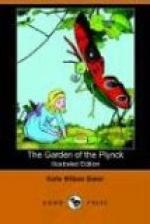For she turned around after a while and saw Sara, and smiled at her without surprise, though she looked absent-minded and wistful.
“It didn’t stick,” she said.
“What didn’t?” asked Sara. Her words may not sound very polite; but if you could have heard the awe and wonder in her little voice you would have pardoned her.
“The poem,” said Avrillia. What was it her voice was like? Sheep-bells? Sheep-bells, that was it. Sheep-bells across an English down—at twilight! Sara had never seen more than three sheep in her life; and those three didn’t wear bells; and she had never heard of a down. And yet, Avrillia’s voice sounded to Sara exactly as I have said.
Moreover, it drew Sara softly to her side. Her dress smelled like isthagaria; and it was very soft to touch. For Sara touched it as confidingly as she would her own mother’s.
At that Avrillia seemed to remember her. Sara saw at once that Avrillia never remembered anybody very long at a time. She was kind, and her smile was entrancingly sweet; but her mind always seemed to be on something else. Probably on her poetry, Sara decided.
Now, however, she remembered Sara, and asked, “Would you like to look over?”
“What’s down there?” Sara could not help asking.
“Nothing. Would you like to see it?”
Sara drew nearer the balustrade, full of awe, and uncertain whether she wished to look or not. But presently curiosity got the better of her, and she leaned over the balustrade and looked down into Nothing. It was very gray.
“Do you throw your poems down there?” she asked of Avrillia, in inexpressible wonder.
“Of course,” said Avrillia. “I write them on rose-leaves, you know—”
“Oh, yes!” breathed Sara. She still thought she had never heard of anything that sounded lovelier than poems written on rose-leaves.
“Petals, I mean, of course,” continued Avrillia, “all colors, but especially blue. And then I drop them over, and some day one of them may stick on the bottom—”
“But there isn’t any bottom,” said Sara, lifting eyes like black pansies for wonder.
“No, there’s no real bottom,” conceded Avrillia, patiently, “but there’s an imaginary bottom. One might stick on that, you know. And then, with that to build to, if I drop them in very fast, I may be able to fill it up—”
“But there aren’t any sides to it, either!” objected Sara, even more wonderingly.
Avrillia betrayed a faint exasperation (it showed a little around the edges, like a green petticoat under a black dress). “Oh, these literal people!” she said, half to herself. Then she continued, still more patiently, “Isn’t it just as easy to imagine sides as a bottom? Well, as I was saying, if I write them fast enough to fill it up—I mean if one should stick, of course—somebody a hundred years from now may come along and notice one of my poems; and then I shall be Immortal.” And at that a lovely smile crossed Avrillia’s face.




